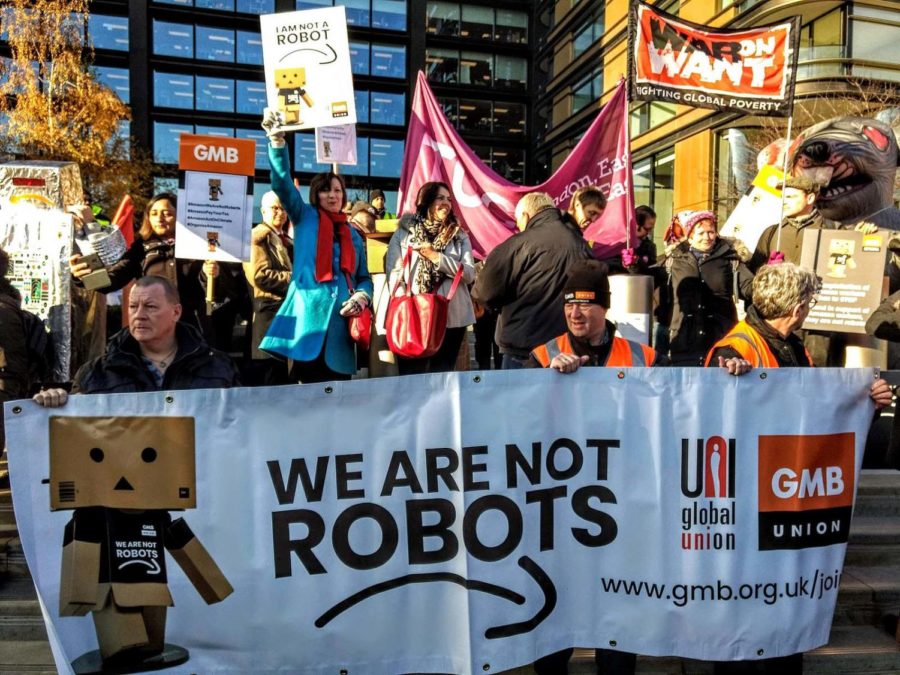Is Corporate America Getting Fixed?
Protestors demand better working conditions at Amazon’s headquarters.
60 million dollars in wages left unpaid. Families struggling to support their children as an American industry titan prioritizes profits over people and blatantly steals from workers. Retail companies manufacturing their products using child labor at detention facilities in Xinjiang and then promoting their ‘corporate values’ to American consumers. Incidents like this are a reflection of a broken corporate system in the United States, and they horrify anyone who reads about them in the news. But why do they happen, and is the 21st century market finally moving away from practices like these?
The main goal of industry is the creation of an end product, benefiting shareholders and filling a gap in the market to provide a service or good that is in demand but doesn’t have adequate supply. But a question that’s becoming more prominent recently is how responsible a company is for the process which it uses to get this product to the market. In other words, does a corporation hold responsibility for just the efficiency of their manufacturing process, or its morality?
There are lots of examples of companies picking the former. Coal, oil and other resources companies, going back to the 18th century, are famous for the poor conditions of workers and the damage done to the environment. Fast fashion brands like GAP and H&M are known for frequently outsourcing labor to developing countries like Bangladesh, in some cases to factories with questionable policies on child labor. These companies pick efficiency, low prices for products and high prices for stocks as their primary concerns.
But, in my opinion, there’s a set of factors that now look like they might change the playing field for industries in America – and there are ways for us to get involved, too.
The first question we have to talk about is offshoring, the practice of shipping manufacturing or other jobs abroad to reduce costs. Companies in wealthy countries like the U.S., with a strong minimum wage and labor standards, have an obvious incentive to do this because they want to minimize labor costs. Recently, however, a geopolitical war has disrupted this trend. The EU and US have engaged in repeated trade wars and disputes with China, Vietnam and even sometimes India – which are the countries that have good manufacturing and offshoring markets, as well as lower labor standards. Because of these disputes, job offshoring is now seen as a potentially bad thing from a strategic point of view, since it makes the US and others reliant on China for manufacturing and domestic demand for goods. And, because of this, in recent years, countries in the EU especially have put a big effort into actually bringing these offshored jobs back and rebuilding domestic manufacturing industries for things like semiconductors. In short, the reason why offshoring as a trend could be going away is politics, and the fact that it’s increasingly being interpreted not as an economic issue, but a national security issue.
The second question we have to talk about is: is the public really willing to sacrifice some of their money to improve working conditions? One of the core pieces to answering this question is Union Labor. Unions have always been generally popular in opinion polls but, like with most issues, there’s a big difference between approving in principle and being willing to pay for it. However, in recent years, even under Republican administrations, lawmakers have demonstrated a willingness to include provisions to ensure union representation in major trade deals. The best example is probably the USMCA agreement signed under President Donald J. Trump, which, despite being signed under a broadly anti-organized labor administration, had provisions in it to guarantee union representation in factories. In other words, there’s been a recent amiability towards raising prices in exchange for worker conditions even at the top level of generally fiscally conservative governments.
The third question that fits into this equation concerns the wealthy. The rise of activist investors, corporate philanthropy and charitable organizations is difficult to give a concrete reason for. Many wealthy people and companies give away for the sake of publicity, relatability, etc., and many companies consider charitable initiatives a part of their corporate ‘image’. But there’s more to it than just that. In 2020, almost 90% of affluent households donated to charity, and the average giving size was 43,000$ – an increase of 50% over three years. Furthermore, many households didn’t set limitations on donation usage and 90% of them donated to local organizations that aren’t as widely known by the media. All of this raises a question – is it really just for show? Well, in my opinion, a lot of it is. But there’s also a broader shift. In his course’s first class teaching Economics to Yale Students, professor Robert Shiller speaks candidly about what career path he expects his students to take: work until 45 to get money, then spend the rest of your life giving it away. A part of why the wealthy have become a key piece of the puzzle when it comes to lobbying for change is that there’s been a change in who is wealthy and why. Just 16% of current millionaires received inheritances of above 100,000$. And, sure, inheritance is not a precise measure of family influence, but it goes to show that new money is taking hold in America – reflecting more of American values, and changing the landscape when it comes to wealth’s influence on politics.
And, lastly, automation. What’s hanging over every aspect of the American economy hangs over this, too. The prospect of automatizing manufacturing has made it easier for both the public and companies themselves to assume that ethical manufacturing processes are possible – after all, robots would replace a sector of manual work that overtaxes its employees. But the rise in automation also presents a difficult choice for companies – either they cut their workforce and replace it with machines (which is really, really unpopular) or they continue having to outsource work abroad (also really, really unpopular) or have to hike prices to accommodate American worker standards (also really, really unpopular). It also presents a problem for blue-collar workers, whose proportion in the American labor force is already shrinking (https://publishing.cdlib.org/ucpressebooks/view?docId=ft158004pr&chunk.id=d0e3212&toc.depth=1&toc.id=d0e3212&brand=ucpress ), but who still retain a significant influence over American government policy, economy and therefore trade practices. But the rise in companies choosing the automation route indicates a broader industry shift towards machines and makes picking the ‘moral’ route both cheaper and more cost efficient for companies – however, at the cost of being accused of choosing machines over their very much human employees.
All of these things come together to contribute as a compound to a rise in public demand for and expectation of corporate action on ethics and morality concerns during their manufacturing process. But companies don’t really have to follow their climate targets, or any goals they claim to set on their manufacturing process, if they can do a good enough job of convincing the public that they are. Greenwashing in America, and developed countries around the world, has reached a fever pitch recently. People around the world are frustrated over a corporate lack of action – and there’s some things that I think we can and should do about this.
It’s important to get involved in organizations that promote accountability and transparency, and inform yourself and others around you to make sure you aren’t deceived by corporate attempts to market themselves as ‘responsible’. But, also, you don’t have to be the tidechanger on this issue, because there’s a set of market winds that are already straining companies’ abilities to put up this ruse. It’s only a matter of time until they stop being able to do these kinds of things, but it’s important that activist investors, innovators and government regulators don’t let up in their pressure and that the public pays attention to and actively supports their battle.
A drop in outsourcing, a rise in acceptance of higher costs for greater morality in manufacturing, a rise in corporate philanthropy and automation all compound to say one thing: the way Corporate America works is rapidly changing. Our market is shifting from focus on profit and the bottom line to a focus on people. This trend is real, persistent and, if the public pays attention, it will be unstoppable. So let’s. Let’s make sure that our market works in a way that better reflects the needs of humanity, and ensures that no American company will exploit workers for the sake of saving a couple of dollars for the average buyer. We can make this change, but it’s important for us to be engaged to do so. So let’s do it – and bring America’s economy into the 21st century.






